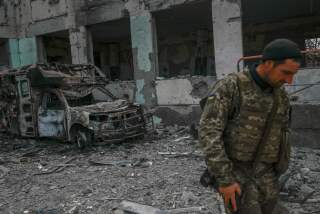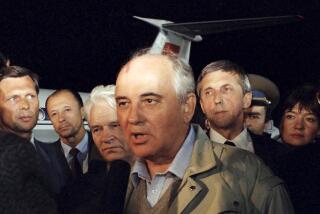A Murky Reading of Russian Tea Leaves
To be a Kremlinologist--thatâs us specialists on Soviet and East European affairs--is to take a little evidence, mix it with some knowledge of the past and common sense, read it through a crystal ball and pretend that you know both what the Soviet leaders are doing and why. Itâs a hit-or-miss profession.
Before looking at last weekendâs shake-up, consider the case of a poor editorial writer for the New York Post in 1953.
One day after Josef Stalinâs death, Kremlinologists learned that all Soviet leaders, except secret police chief Lavrenti Beria, had attended the Bolshoi Balletâs performance of âSwan Lakeâ the night before. The evidence led to the âobviousâ conclusion: Beria must be on his way out.
Not so fast, said the New York Postâs editorial writer. Sarcastically, he asked: Couldnât it be that Beria was absent because he doesnât like ballet? Or, if he likes ballet, couldnât it be that he doesnât care for âSwan Lakeâ?
Within hours after the editorial appeared came the news from Moscow: Beria had been unmasked as an âenemy of the peopleâ and shot. We never did learn what he thought of ballet. Today, those who lose out in the struggle for power in the Kremlin no longer lose their lives. Theyâre ârelieved of their duties.â They âretire.â They âtake up new duties.â If theyâre out, their successors show mercy but not much appreciation. Nikita S. Khrushchev attacked Stalin. Leonid I. Brezhnev went after Khrushchevâs unspecified âharebrainedâ schemes. Mikhail S. Gorbachev has turned on Brezhnev and his era of âstagnation.â
Now, even in the era of glasnost, we still must study the tea leaves, trying to read meaning into seemingly meaningless communiques.
Take Andrei A. Gromykoâs retirement. This old fox, who has served every Soviet leader since the late 1930s, is 79. As he is known to be in reasonably good health, why is he retiring now? Why not at age 70 or 75 or 80? One cannot know for sure, but a good guess is that he has outlived his usefulness. He was kept as the Soviet Unionâs nominal president and Politburo member as long as Gorbachev needed to show a modicum of continuity with the past. It could also be that, until now, Gorbachev was not strong enough to elbow Gromyko out of the Kremlinâs inner sanctum.
This makes good Kremlinological sense, doesnât it? Yes, but look again. If Gorbachev kept Gromyko to show a modicum of continuity with the past this summer or last year, why doesnât he need continuity now? And what about Gorbachevâs strength? If he wasnât strong enough to get rid of Gromyko this summer or last year, how come he is so strong now? Surely his policies have not yet paid off; there is less food in Moscow now than a year or two ago. Then what has given him new strength? Did he take steroids during his vacation in August? If so, why didnât Gromyko take some, too?
The case of Yegor K. Ligachev, until now Gorbachevâs deputy, is even more intriguing and surely more important.
Last spring, when Gorbachev was away from Moscow, Ligachev apparently authorized the publication of an article that amounted to an anti-Gorbachev manifesto. Yet at the June party conference Gorbachev and Ligachev joined forces against Boris Yeltsin, the former Moscow party chief, and Soviet spokesmen assured us that Gorbachev and Ligachev got along just fine. If they did, their friendship didnât last long. For in August, when Gorbachev was on vacation, Ligachev made a couple of speeches that questioned Gorbachevâs party line. Once again, Soviet spokesmen assured all that the leadership was united-- kak izvestno, as they say in Russian, âas is well-known.â
Last weekend Ligachev was demoted. Heâs down but not out. He is now in charge of agriculture, not ideology. Western Kremlinologists can explain it: Gorbachev was strong enough to ease aside his main rival, but not strong enough to kick him out. That makes sense, except that (a) itâs still unclear where Gorbachevâs sudden strength comes from, and (b) itâs unclear why Gorbachev dropped Gromyko, who was too old to be an effective opponent, but failed to drop Ligachev who was, and presumably remains, a strong rival.
Could it be, then, that Gorbachev didnât win over the weekend after all? Well, yes. With Ligachev in charge of agriculture and Viktor M. Chebrikov, a Ligachev ally, in charge of political reforms, the anti-Gorbachev forces now control the two most important aspects of the pro-Gorbachev program. Indeed, Ligachev may have volunteered for the agriculture portfolio because (a) he needed a new challenge, and (b) he remembered that his rival Gorbachev got the top job in 1985 after serving as the partyâs agriculture specialist in the early 1980s. Gorbachevâs career may have convinced Ligachev that you become No. 1 in the Kremlin after you hold the agriculture portfolio and fail.
On the third hand--or is it the fourth?--it is also possible that Gorbachev assigned the forbidding challenge of the agriculture portfolio to Ligachev so that Ligachev would prove his incompetence. After all, under perestroika, failure can now cost your job in the Soviet Union, canât it?
Well, as Kremlinologists like to conclude, it remains to be seen. Time will tell. In any case, stay tuned. We may know more after the Bolshoi Balletâs next performance of âSwan Lake.â
More to Read
Sign up for Essential California
The most important California stories and recommendations in your inbox every morning.
You may occasionally receive promotional content from the Los Angeles Times.










